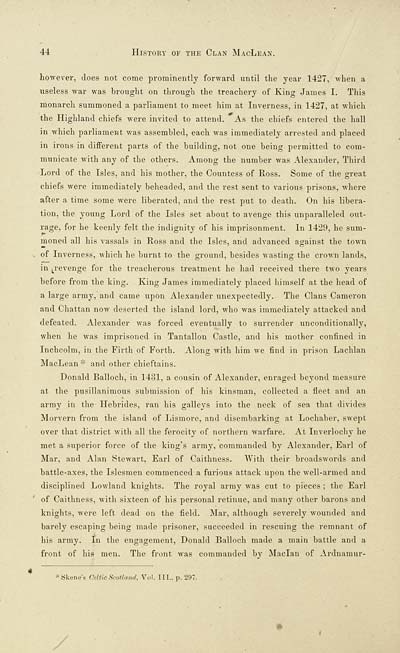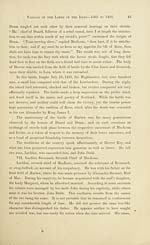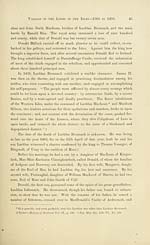History of the Clan MacLean from its first settlement at Duard Castle, in the Isle of Mull, to the present period
(50) Page 44
Download files
Complete book:
Individual page:
Thumbnail gallery: Grid view | List view

44 History of the Clan MacLean.
liQ-wever, does not come prominently forward until the year 1427, when a
useless war was brought on through the treachery of King James I. This
monarch summoned a parliament to meet him at Inverness, in 1427, at which
the Highland chiefs were invited to attend. As the chiefs entered the hall
in which parliament was assembled, each was immediately arrested and placed
in irons in diiferent parts of the building, not one being permitted to com-
municate with any of the others. Among the number was Alexander, Third
Lord of the Isles, and his mother, the Countess of Ross. Some of the great
chiefs were immediately beheaded, and the rest sent to various prisons, where
after a time some were liberated, and the rest put to death. On his libera-
tion, the young Lord of the Isles set about to avenge this unparalleled out-
rage, for he keenly felt the indignity of his imprisonment. In 1429, he sum-
moned all his vassals in Ross and the Isles, and advanced against the town
of Inverness, which he burnt to the ground, besides wasting the crown lands,
in ^^rcvenge for the treacherous treatment he had received there two years
before from the king. King James immediately placed himself at the head of
a large army, and came upon Alexander unexpectedly. The Clans Cameron
and Chattan now deserted the island lord, who was immediately attacked and
defeated. Alexander was forced eventually to surrender unconditionally,
when he w-as imprisoned in Tantallon Castle, and his mother confined in
Inchcolm, in the Firth of Forth. Along with him we find in prison Lachlan
MacLean * and other chieftains.
Donald Balloch, in 1431, a cousin of Alexander, enraged beyond measure
at the pusillanimous submission of his kinsman, collected a fleet and an
army in the Hebrides, ran his a:allevs into the neck of sea that divides
Morvern from the island of Lismore, and disembarking at Lochaber, swept
over that district with all the ferocitj^ of northern warfare. At Inverlochy he
met a superior force of the king's army, commanded by Alexander, Earl of
Mar, and Alan Stewart, Earl of Caithness. With their broadswords and
battle-axes, the Islesmen commenced a furious attack upon the well-armed and
disciplined Lowland knights. The royal army was cut to pieces ; the Earl
of Caithness, with sixteen of his personal retinue, and many other barons and
knights, were left dead on the field. Mar, although severely wounded and
barely escaping being made prisoner, succeeded in rescuing the remnant of
his army. In the engagement, Donald Balloch made a main battle and a
front of his men. The front was commanded by Maclan of Ardnamur-
» Skene's Celtic Scoihnid, Vol. III., p. 297.
/
liQ-wever, does not come prominently forward until the year 1427, when a
useless war was brought on through the treachery of King James I. This
monarch summoned a parliament to meet him at Inverness, in 1427, at which
the Highland chiefs were invited to attend. As the chiefs entered the hall
in which parliament was assembled, each was immediately arrested and placed
in irons in diiferent parts of the building, not one being permitted to com-
municate with any of the others. Among the number was Alexander, Third
Lord of the Isles, and his mother, the Countess of Ross. Some of the great
chiefs were immediately beheaded, and the rest sent to various prisons, where
after a time some were liberated, and the rest put to death. On his libera-
tion, the young Lord of the Isles set about to avenge this unparalleled out-
rage, for he keenly felt the indignity of his imprisonment. In 1429, he sum-
moned all his vassals in Ross and the Isles, and advanced against the town
of Inverness, which he burnt to the ground, besides wasting the crown lands,
in ^^rcvenge for the treacherous treatment he had received there two years
before from the king. King James immediately placed himself at the head of
a large army, and came upon Alexander unexpectedly. The Clans Cameron
and Chattan now deserted the island lord, who was immediately attacked and
defeated. Alexander was forced eventually to surrender unconditionally,
when he w-as imprisoned in Tantallon Castle, and his mother confined in
Inchcolm, in the Firth of Forth. Along with him we find in prison Lachlan
MacLean * and other chieftains.
Donald Balloch, in 1431, a cousin of Alexander, enraged beyond measure
at the pusillanimous submission of his kinsman, collected a fleet and an
army in the Hebrides, ran his a:allevs into the neck of sea that divides
Morvern from the island of Lismore, and disembarking at Lochaber, swept
over that district with all the ferocitj^ of northern warfare. At Inverlochy he
met a superior force of the king's army, commanded by Alexander, Earl of
Mar, and Alan Stewart, Earl of Caithness. With their broadswords and
battle-axes, the Islesmen commenced a furious attack upon the well-armed and
disciplined Lowland knights. The royal army was cut to pieces ; the Earl
of Caithness, with sixteen of his personal retinue, and many other barons and
knights, were left dead on the field. Mar, although severely wounded and
barely escaping being made prisoner, succeeded in rescuing the remnant of
his army. In the engagement, Donald Balloch made a main battle and a
front of his men. The front was commanded by Maclan of Ardnamur-
» Skene's Celtic Scoihnid, Vol. III., p. 297.
/
Set display mode to:
![]() Universal Viewer |
Universal Viewer | ![]() Mirador |
Large image | Transcription
Mirador |
Large image | Transcription
Images and transcriptions on this page, including medium image downloads, may be used under the Creative Commons Attribution 4.0 International Licence unless otherwise stated. ![]()
| Histories of Scottish families > History of the Clan MacLean from its first settlement at Duard Castle, in the Isle of Mull, to the present period > (50) Page 44 |
|---|
| Permanent URL | https://digital.nls.uk/94802483 |
|---|
| Description | A selection of almost 400 printed items relating to the history of Scottish families, mostly dating from the 19th and early 20th centuries. Includes memoirs, genealogies and clan histories, with a few produced by emigrant families. The earliest family history goes back to AD 916. |
|---|

